Organizational Behavior
- 格式:doc
- 大小:126.47 KB
- 文档页数:36
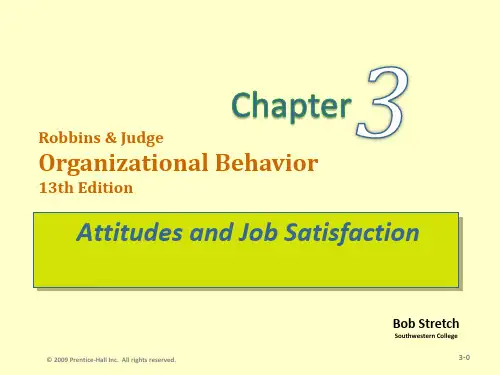
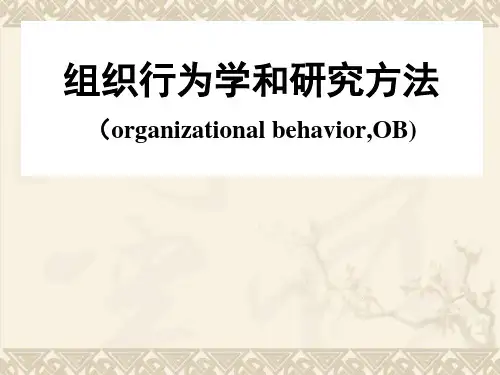
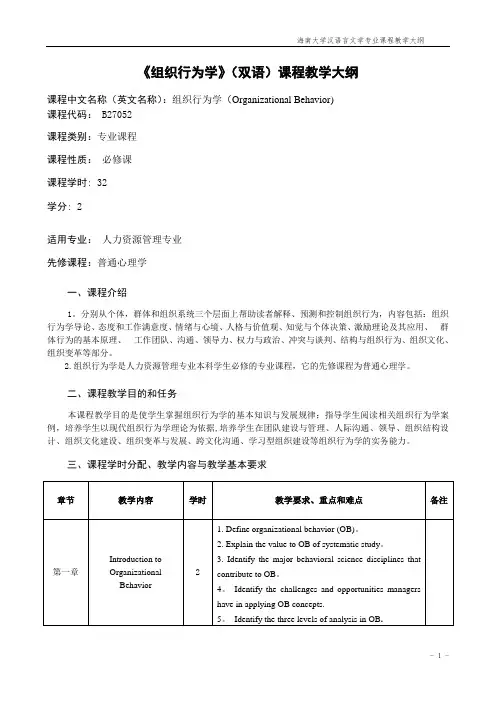
《组织行为学》(双语)课程教学大纲课程中文名称(英文名称):组织行为学(Organizational Behavior)课程代码:B27052课程类别:专业课程课程性质:必修课课程学时: 32学分: 2适用专业:人力资源管理专业先修课程:普通心理学一、课程介绍1。
分别从个体,群体和组织系统三个层面上帮助读者解释、预测和控制组织行为,内容包括:组织行为学导论、态度和工作满意度、情绪与心境、人格与价值观、知觉与个体决策、激励理论及其应用、群体行为的基本原理、工作团队、沟通、领导力、权力与政治、冲突与谈判、结构与组织行为、组织文化、组织变革等部分。
2.组织行为学是人力资源管理专业本科学生必修的专业课程,它的先修课程为普通心理学。
二、课程教学目的和任务本课程教学目的是使学生掌握组织行为学的基本知识与发展规律;指导学生阅读相关组织行为学案例,培养学生以现代组织行为学理论为依据,培养学生在团队建设与管理、人际沟通、领导、组织结构设计、组织文化建设、组织变革与发展、跨文化沟通、学习型组织建设等组织行为学的实务能力。
三、课程学时分配、教学内容与教学基本要求四、教学方法与教学手段1、阅读:本科程要求学生在阅读教材的基础上,泛读规定的参考教材。
老师随堂抽查学生阅读情况.2、听课:本课程要求学生进课堂听讲全部课程,并做好笔记。
听课和笔记情况随时检查,记入平时成绩.3、辅导:要求学生主动学习,随时提出问题,老师随堂辅导。
要求学生与老师建立电话、电子邮箱、QQ、微信联系,交流自学情况。
另外,每学期期末集中大型辅导1次。
五、考核方式和成绩评定方法考核方式:期末闭卷考试成绩评定方法:平时成绩(含考勤、回答问题、作业等)占30%,期末考试成绩占70%六、教材与主要参考书目教材:《Essentials of Organizational Behavior》,Stephen P。
Robbins等,中国人民大学出版社,2011年.参考书目:《组织行为学》,陈春花等,机械工业出版社,2013年。
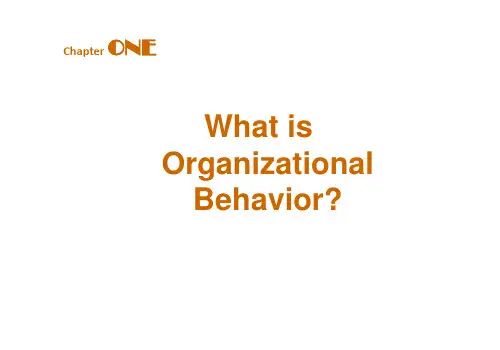

组织行为学名词解释组织行为学(Organizational Behavior,简称OB)是研究个体、团队和组织在工作环境中的行为和互动的学科。
它关注员工的行为和决策,以及如何管理这些行为以达成组织的目标。
以下针对组织行为学的一些关键概念进行详细解释。
1. 个体行为个体行为是指在组织中个人展示出的行动和决策。
个体行为的研究关注员工的情绪、动机、个性、态度以及他们与工作的认同度等因素。
这种研究有助于了解员工在组织中的表现和如何激励他们提高绩效。
2. 团队效能团队效能是团队成员有效地协同合作以实现共同目标的程度。
团队效能的高低与团队沟通、决策过程、信任、共享目标和角色明确程度等因素密切相关。
有效的团队效能有助于解决问题、增加创新和提高绩效。
3. 组织文化组织文化是指在组织中共享的信念、价值观、行为规范和工作方式。
组织文化对员工的行为和态度产生影响,它可以塑造组织的身份认同、激励员工的工作态度,并影响组织的绩效和适应性。
4. 领导力领导力是指影响和指导员工实现组织目标的能力。
领导力研究着重于领导者的特质、行为和影响力,以及如何培养和提高领导力。
有效的领导力可以激发员工的创造力、建立高绩效的团队和塑造积极的组织文化。
5. 组织变革组织变革是组织在追求适应环境和实现目标时的重大改变。
组织变革包括战略转变、结构重组、文化改变等。
研究组织变革可以帮助管理者理解变革过程中员工的情感反应、应对挑战并确保变革成功。
6. 动机理论动机理论研究个体为何会产生行为并如何维持行为的动力。
经典的动机理论包括马斯洛的需求层次理论、赫茨伯格的双因素理论和期望理论等。
了解员工的动机可以帮助管理者设计适当的激励措施,提高员工的工作满意度和绩效。
7. 决策过程决策过程是指个体或团队在做出选择时的思考和行动过程。
决策过程可以通过理性决策模型、行为决策模型和政治决策模型来解释。
了解决策过程有助于优化组织中的决策效果,提高组织的绩效和创新能力。
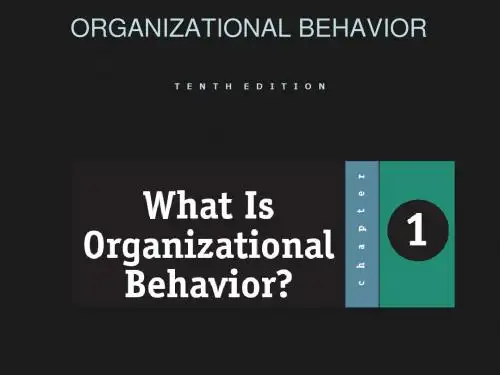
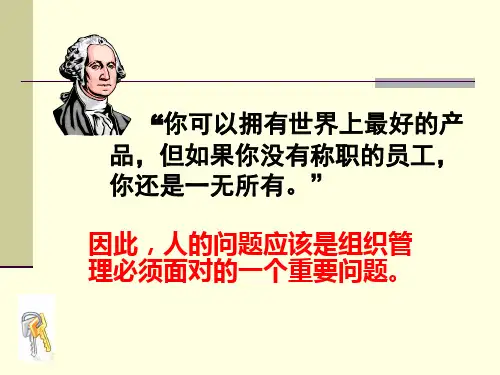
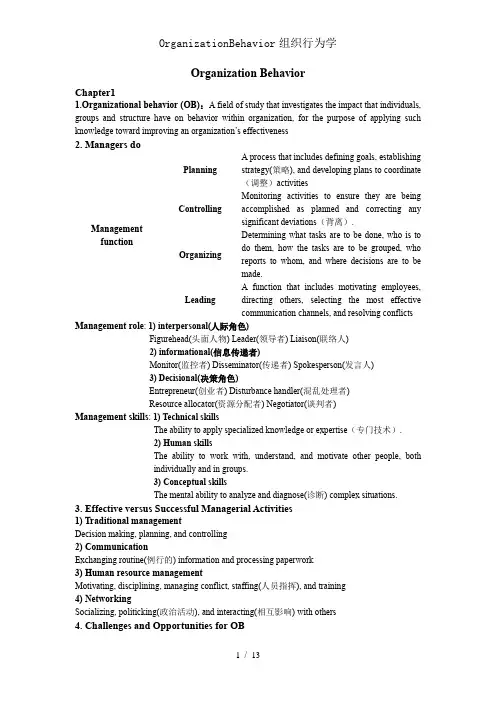
Organization BehaviorChapter1anizational behavior (OB):A field of study that investigates the impact that individuals, groups and structure have on behavior within organization, for the purpose of applying such knowledge toward improving an organization’s effectiveness2. Managers doManagement functionPlanningA process that includes defining goals, establishingstrategy(策略), and developing plans to coordinate(调整)activitiesControllingMonitoring activities to ensure they are beingaccomplished as planned and correcting anysignificant deviations(背离).OrganizingDetermining what tasks are to be done, who is todo them, how the tasks are to be grouped, whoreports to whom, and where decisions are to bemade.LeadingA function that includes motivating employees,directing others, selecting the most effectivecommunication channels, and resolving conflictsManagement role: 1) interpersonal(人际角色)Figurehead(头面人物) Leader(领导者) Liaison(联络人)2) informational(信息传递者)Monitor(监控者) Disseminator(传递者) Spokesperson(发言人)3) Decisional(决策角色)Entrepreneur(创业者) Disturbance handler(混乱处理者)Resource allocator(资源分配者) Negotiator(谈判者)Management skills: 1) Technical skillsThe ability to apply specialized knowledge or expertise(专门技术).2) Human skillsThe ability to work with, understand, and motivate other people, bothindividually and in groups.3) Conceptual skillsThe mental ability to analyze and diagnose(诊断) complex situations.3. Effective versus Successful Managerial Activities1) Traditional managementDecision making, planning, and controlling2) CommunicationExchanging routine(例行的) information and processing paperwork3) Human resource managementMotivating, disciplining, managing conflict, staffing(人员指挥), and training4) NetworkingSocializing, politicking(政治活动), and interacting(相互影响) with others4. Challenges and Opportunities for OB1) Responding to GlobalizationIncreased foreign assignmentsWorking with people from different culturesOverseeing movement of jobs to countries with low-cost labor2) Managing Workforce Diversity(差异,多样性)Embracing diversityChanging demographics(人口)Implications for managersRecognizing and responding to differences3) Improving Quality and ProductivityQuality management (QM)Process reengineering4) Responding to the Labor ShortageChanging work force demographicsFewer skilled laborersEarly retirements and older workers5) Improving Customer ServiceIncreased expectation of service qualityCustomer-responsive cultures6) Improving People Skills7) Empowering(授权) People8) Stimulating(刺激) Innovation(改革) and Change9) Coping with “Temporariness(临时性)”10) Working in Networked Organizations11) Helping Employees Balance Work/Life Conflicts12) Improving Ethical(伦理的) Behavior5. Independent and dependent variables1) individual-level variables个体水平变量人们带着不同的特点进入组织,这些特点将影响到他们在工作中的行为。
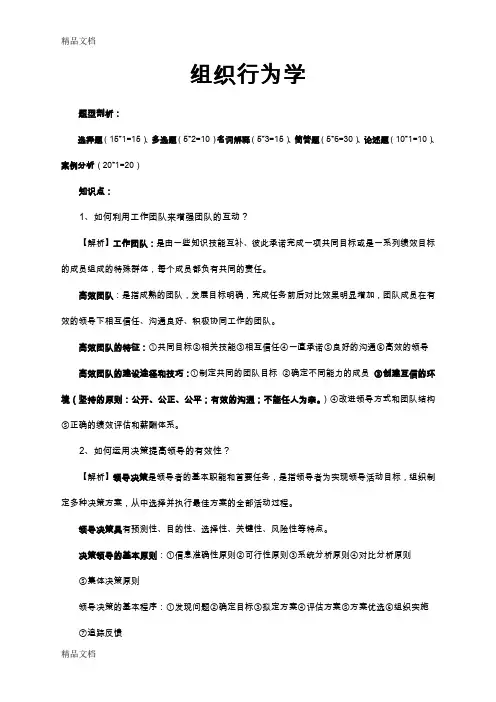
组织行为学题型剖析:选择题(15*1=15)、多选题(5*2=10)名词解释(5*3=15)、简答题(5*6=30)、论述题(10*1=10)、案例分析(20*1=20)知识点:1、如何利用工作团队来增强团队的互动?【解析】工作团队:是由一些知识技能互补、彼此承诺完成一项共同目标或是一系列绩效目标的成员组成的特殊群体,每个成员都负有共同的责任。
高效团队:是指成熟的团队,发展目标明确,完成任务前后对比效果明显增加,团队成员在有效的领导下相互信任、沟通良好、积极协同工作的团队。
高效团队的特征:①共同目标②相关技能③相互信任④一直承诺⑤良好的沟通⑥高效的领导高效团队的建设途径和技巧:①制定共同的团队目标②确定不同能力的成员③创建互信的环境(坚持的原则:公开、公正、公平;有效的沟通;不能任人为亲。
)④改进领导方式和团队结构⑤正确的绩效评估和薪酬体系。
2、如何运用决策提高领导的有效性?【解析】领导决策是领导者的基本职能和首要任务,是指领导者为实现领导活动目标,组织制定多种决策方案,从中选择并执行最佳方案的全部活动过程。
领导决策具有预测性、目的性、选择性、关键性、风险性等特点。
决策领导的基本原则:①信息准确性原则②可行性原则③系统分析原则④对比分析原则⑤集体决策原则领导决策的基本程序:①发现问题②确定目标③拟定方案④评估方案⑤方案优选⑥组织实施⑦追踪反馈群体决策的方法:①头脑风暴法②德尔菲法③案例提前分析法④提喻法决策的民主化的条件和途径:领导者要具备民主作风和素质、建立起决策参与民主机制、实现决策制定程序和执行程序民主化、建立决策监督机制接受群众监督决策。
3、组织设计应遵循的原则?【解析】原则:①专业化分工原则②统一指挥原则③控制幅度原则④权责对等原则⑤柔性经济原则4、内聚力的定义,作用,影响因素?【解析】定义:群体凝聚力又称群体内聚力,它是群体成员施加各种影响,使之在群体内积极活动和拒绝离开群体的全部力量的总和,是群体对个体的吸引力作用:①内聚力和工作绩效的关系②内聚力与员工满意度的关系③内聚力与员工个人的成长1、如果群体目标与组织大目标一致,且群体成员对组织大目标持支持态度时,凝聚力高的群体比凝聚力低的群体更为有效。
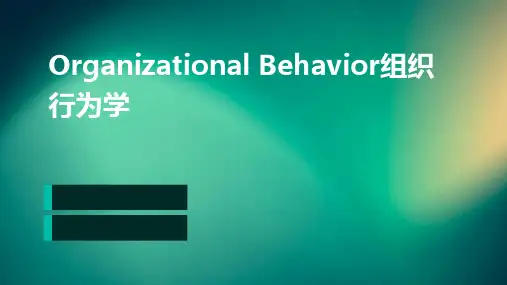
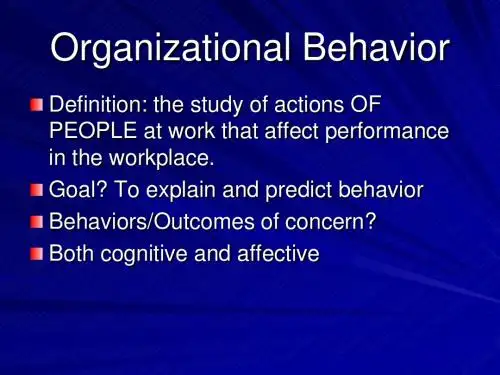
组织行为学英文参考文献Organizational Behavior: A Literature ReviewOrganizational behavior (OB) is a field of study that examines the impact of individuals, groups, and structures on behavior within organizations. It is an interdisciplinary field that draws from various disciplines, including psychology, sociology, anthropology, and management. The primary goal of OB is to understand and predict human behavior in organizational settings, with the ultimate aim of improving organizational effectiveness and efficiency.One of the key areas of focus in OB is the study of individual behavior within organizations. This includes factors such as personality, attitudes, perception, learning, and motivation. Understanding how these individual-level factors influence employee behavior and performance is crucial for managers and leaders. For example, research has shown that employees with a high need for achievement are more likely to be successful in their careers, while those with a high need for affiliation may be better suited for roles that involve collaboration and teamwork.Another important aspect of OB is the study of group dynamics andteam behavior. This includes examining how factors such as group size, cohesion, and leadership influence the way groups function and perform. Effective teamwork and collaboration are essential for organizational success, and OB research has provided valuable insights into how to foster these qualities. For instance, studies have shown that teams with clear goals, well-defined roles, and open communication tend to be more effective than those without these characteristics.Organizational structure and design are also key areas of focus in OB. This includes understanding how different organizational structures (e.g., hierarchical, matrix, or network) and processes (e.g., decision-making, communication, and control) impact employee behavior and organizational outcomes. Effective organizational design can help to align the organization's structure and processes with its strategic goals and the needs of its employees.Another important area of OB is the study of organizational culture and its impact on employee behavior and performance. Organizational culture refers to the shared values, beliefs, and assumptions that guide the behavior of individuals within an organization. A strong, positive organizational culture can foster employee engagement, commitment, and job satisfaction, while a dysfunctional culture can lead to a variety of negative outcomes, such as high turnover, poor communication, and decreasedproductivity.OB research has also examined the role of leadership in shaping organizational behavior. Effective leadership is essential for organizational success, and OB research has provided valuable insights into the characteristics and behaviors of effective leaders. For example, research has shown that transformational leaders, who inspire and motivate their followers, tend to be more effective than transactional leaders, who focus on contingent rewards and punishments.In addition to these core areas, OB research has also explored a variety of other topics, such as organizational change and development, organizational politics and power, and the impact of technology on organizational behavior. As the business environment continues to evolve, the field of OB will need to adapt and expand to address new challenges and opportunities.Overall, the field of organizational behavior is a rich and dynamic area of study that has made significant contributions to our understanding of human behavior in organizational settings. By applying the principles and findings of OB research, organizations can improve their effectiveness, enhance employee well-being, and ultimately achieve their strategic goals.。
Organizational Behavior
Part1: Introduction to Organizational Behavior
Chapter1:organizational behavior overview Organizational behavior (OB) is a field of study devoted to understanding, explaining, and ultimately improving the attitudes and behaviors of individuals and groups in organizations.
OB source:
1.Industrial and organizational psychology
2. Social psychology
3. Sociology
4. Anthropology
5. Economics
Integrative model of organizational behavior
1.Individual outcomes:
Job performance;Organizational commitment
2.Individual mechanisms:
Job satisfaction; stress; motivation; trust,justice and ethics; Learning and decision making
Individual characteristics:
Personality; cultural values; ability
Group mechanisms:
Teams; leaderships
OB在讲什么?(图p.7)
Building a conceptual argument进行概念性论证
Resource-based view
◆Financial(revenue,equity)resources
◆Physical(buildings,machines,technology)resources
◆Other resources(knowledge,decision-making,ability,culture) What makes a resource valuable?(图p.11)
Rare: resources,people
Inimitable:
1.history-----a collective pool of experience,wisdom,and knowledge that benefits the organization.
2.Numerous small decisions-----people make many small decisions day-in and day-out,week-in and week-out.
3.Socially complex resources-----culture,trust,reputation.
Rule of one-eight
Three different correlation sizes (p.15)
How do we know OB?(p.15)
◆Method of Experience---people hold firmly to some belief
because it is consistent with their own experience and observations.
◆Method of Intuition---people hold firmly to some belief because
it “just stands to reason”--it seems obvious or self-evident.。